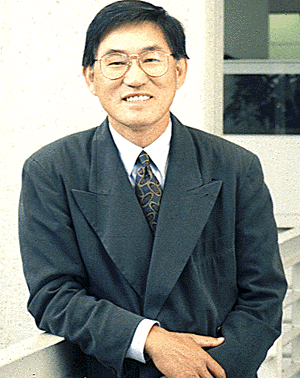|
GOLDSEA |
ASIAN AMERICAN RAGS-TO-RICHES SAGAS
RICHES FROM RAGS
PAGE 3 OF 15
Despite his soft-spoken demeanor, Mow is a hardnosed realist. There are
sharp edges just below the surface and they can cut. Impatient with
abstractions and starry-eyed notions about what the world should be like, he
returns every discussion to cold, hard, even cruel, realities. About
Tiananmen Square he says, "If they didn't stop the demonstrations then by
killing 3,000, they would have had to kill 150,000 because they weren't
about to give up power. The students forgot they're dealing with a
totalitarian government." For Mow, the immovable fact in any discussion
about China is its 1.2 billion people. "We need China," he says. "If we
stopped doing business with China, we would see inflation ten times worse
than [what we're seeing with] the Iraqi crisis. 15% of our retail is [made in]
China, 30% of toys, 30% of apparel. If we turn our back on China, they'll say,
'See you in another 40 years', and slam the doors."
Mow's prickly views on China are probably fueled in part by practical
considerations. With its cheap labor China accounts for 25% of Bugle Boy's
garment production. Without its most-favored-nation status, China would
lose its import quotas, forcing BBI and other makers to scramble for a bigger
share of the quotas alotted to Taiwan, Korea, Hong Kong and Singapore, places
that already account for 75% of BBI's manufacturing. Paying for available
quotas is a big part of the cost of importing, and keeping trade open with the
maximum number of Asian trading partners is important to overseas
producers like Bugle Boy. Low-cost overseas production is what lets BBI
provided exceptional value. Not surprisingly Mow is one of the Chinese
Americans assiduously cultivated by the Chinese government to help lobby
Congress to maintain China's most-favored-nation status.
At the end of September Mow left on a trip to Hangchow, his home town,
sponsored and paid for by China's state-run textile company. "Japan is now
our only Pacific ally," Mow continues. Korea and Taiwan he dismisses on
numerical grounds. "What's 42 million [Koreans] compared to 1.2 billion? It
rounds off." He points out that China is one of the five members of the UN
Security Council with the power to veto U.S. initiatives. Neither sentiment
nor tact keeps Mow from dispatching objections with the soft-spoken
directness of a pope or a mafia don. It occurs to me that his refusal to spend
energy on vocal volume is another reflection of his compulsion to cut
waste.
"Everyone knows I'm all-powerful," he says. "I don't have to prove
anything." It's easy to imagine Mow visiting subordinates on a rotation basis,
quietly listening to reports until sensing a potential problem or an overlooked
opportunity, a glitch developing in the system. A few words are uttered, just
enough to convey the concern, and Mow has moved on to the next
department, fully expecting that his concerns will be addressed.
Florette Cicconi, Mow's personal secretary, steps in to ask if we need more
coffee. She is an attractive and vivacious former dancer who has been with
Mow for 22 years, since his first days as an entrepreneur. She serves us with
the quiet efficiency of a first-class flight attendant. "Outside of bed, she
knows more about me than any woman, including my wife," Mow says.
"Unlike some executives he doesn't give the impression of doting on his
employees. He doesn't make unnecessary introductions, joke with them or
address them familiarly. There seems to be a tacit understanding that allows
such niceties to be dispensed with. Even before the subvject comes up I
sense that Mow's Asian heritage extends far deeper than his wall hangings
and probably beyond the 15% of his psyche he attributes to it in public talks.
Understatement and quiet efficiency is BBI's modus operandi. There is no
place here for hype or overt aggressiveness. After a sip or two of coffee,
Mow calls for Crystal Geyser Mineral Water, apparently his office beverage of
choice. There is something distinctly Chinese about the way he expects to be
waited on hand and foot.
PAGE 4
PAGE 1 |
2 |
3 |
4 |
5 |
6 |
7 |
8 |
9 |
10 |
11 |
12 |
13 |
14 |
15
|
|
|
|

<
|
“We need China. If we stopped doing business
with China, we would see inflation ten times worse than [what we're seeing with] the Iraqi
crisis.”
|
CONTACT US
|
ADVERTISING INFO
© 1996-2013 Asian Media Group Inc
No part of the contents of this site may be reproduced without prior written permission.
|







